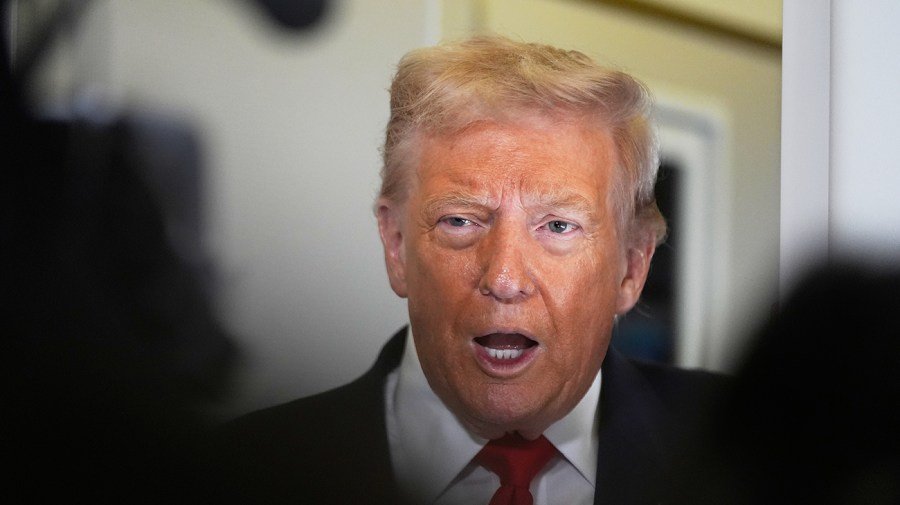
President Trump’s fresh push for Republicans to abandon the Senate filibuster is showing little sign of success, even as lawmakers struggle to find a way out of the ongoing government shutdown.
Trump’s call for Senate Republicans to use the “nuclear option” underscores his growing frustration with the government shutdown as it enters its second month. But it faces stiff headwinds from senators in his own party who have been adamantly opposed to getting rid of the tactic.
A spokesperson for Senate Majority Leader John Thune (R-S.D.) said Thune’s position “on the importance of the legislative filibuster is unchanged.”
Sen. John Curtis (R-Utah) posted on the social platform X that he was a “firm no” on eliminating the filibuster.
“The filibuster forces us to find common ground in the Senate. Power changes hands, but principles shouldn’t,” Curtis posted.
Speaker Mike Johnson (R-La.), while not in the Senate, mostly responded to Trump’s post by pointing out how eliminating the filibuster could boomerang back around to hurt Republicans in the future.
Johnson argued if Democrats had a majority without the filibuster in place, they would make the District of Columbia and Puerto Rico states, alter the Supreme Court, ban firearms, and “do all sorts of things that would be very harmful for the country.”
“The filibuster has traditionally been viewed as a very important safeguard. If the shoe was on the other foot, I don’t think our team would like it,” Johnson said.
Trump late Thursday threw a curveball into efforts to end the shutdown with his plea for Senate Republicans to get rid of the filibuster and unilaterally vote to reopen the government. The president made the case that failing to nuke the filibuster, which requires most legislation in the Senate to garner 60 votes, could ultimately harm Republicans politically.
“If the Democrats ever came back into power, which would be made easier for them if the Republicans are not using the Great Strength and Policies made available to us by ending the Filibuster, the Democrats will exercise their rights, and it will be done in the first day they take office, regardless of whether or not we do it,” Trump posted on Truth Social.
This week was not the first time Trump has called for an end to the filibuster. He did so multiple times in his first term, using a similar argument that Democrats would try the same thing if they took the majority.
Then-President Biden, then-Vice President Harris and some Democratic senators pushed to alter the filibuster to pass voting rights and abortion legislation, though it ultimately failed to garner enough support within the party.
Trump has largely avoided directly weighing in on efforts on Capitol Hill to end the shutdown, and White House allies have argued there is little incentive for the president to get involved since he has carried out his agenda unabated. Trump’s latest post came on the heels of a trip to Asia, where he worked to broker trade agreements with China, Japan, South Korea and other countries.
But some close to the president suggested the timing of his filibuster post was a reflection of mounting frustration over Democrats’ continued refusal to back a GOP-led continuing resolution to fund the government at current levels. Any funding measure in the Senate requires at least seven Democrats to join with all 53 Republicans to overcome the filibuster and pass.
“What you’re seeing is an expression of the president’s anger at the situation,” Johnson said. “He is as angry as I am, as the American people are about this madness. And he just desperately wants the government to be reopened so that all these resources can flow to the people who need it so much.”
Some Senate Republicans have in recent days increasingly discussed changing the filibuster’s rules if Democrats do not end the shutdown. But doing so would require a majority of Republicans to back the change, and it’s unlikely the party has the needed support even with Trump’s urging.
Instead, Thune and other top Republicans have been searching for other ways to break the stalemate and end the shutdown as it threatens various government programs and causes issues at major airports.
Thune told reporters Wednesday that moderate Democrats are looking for an “off-ramp” to end the shutdown, adding that he’s willing to talk to them about the concessions he has already offered, such as a vote on Democrats’ proposal to extend Affordable Care Act subsidies beyond December.
Trump on Friday was not asked about the filibuster as he traveled to Florida for the weekend. But he reiterated that he would only meet with Democrats to discuss policy matters after the government was reopened.
“I’m always willing to meet. All they have to do is open up the country,” Trump told reporters. “Let them open up the country, and we’ll meet. We’ll meet very quickly, but they have to open up the country. It’s their fault. Everything is their fault.”


